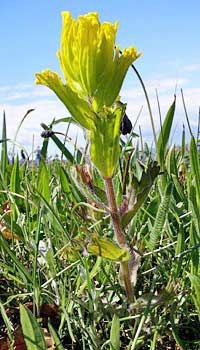Stake your claim for gold — as in golden paintbrush — by joining park staff and volunteers in planting more than 2,000 seedlings in a section of the American Camp prairie from 10 a.m. to noon, Wednesday, Dec. 5, meeting at the American Camp visitor center.
Those arriving late should look for the planting party on the north side of Redoubt Road, midway between the Redoubt and Pickett’s Lane. For accessibility information, call 360-378-2240, ext. 2233.
Golden paintbrush (Castilleja levisecta) is a symbol of the native northwest prairies, an ecosystem that has been reduced by more than 90 percent. As with the prairie habitat that sustains them, golden paintbrush populations have decreased dramatically.
Formerly found in Oregon, Washington, and British Columbia, the plant has been reduced to fewer than 11 populations in Washington and Canada.
“The Puget Sound Prairie ecosystem, of which golden paintbrush is a part, is the most rapidly-declining ecosystem in the Pacific Northwest,” said Jerald Weaver, park chief of integrated resources. “When an ecosystem is disrupted, its health is compromised and species may be lost. Such losses diminish the quality and diversity of the world in which we live. The golden paintbrush is an important part of a healthy Puget Sound ecosystem.”
The U.S. Fish and Wildlife Service and the National Park Service are working together to prioritize conservation actions that protect golden paintbrush, Weaver said.
These actions include:
— Identify best management practices to protect and improve the health of the prairie ecosystem.
— Remove trees and shrubs.
— Mow or burn the prairies to reduce competition by non-native species.
— Reintroducing golden paintbrush plants to prairie ecosystem
Bring gloves, rain gear and sturdy boots. For more information, call Education Specialist Raena Parsons at 360-378-2240 ext. 2222 , or the Interpretation staff at 360-378-2240, ext. 2233.



